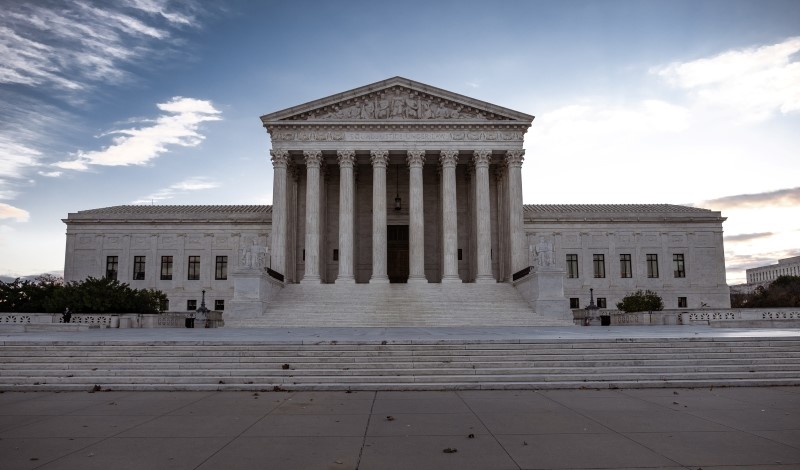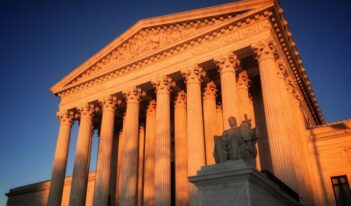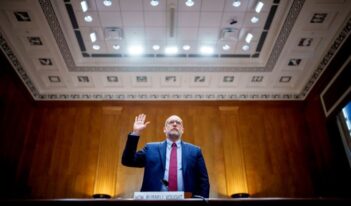
The Supreme Court should decide two monumental lawsuits about former President Trump with short, narrow, and unanimous opinions.
The U.S. Supreme Court will be required to make two of the most important decisions in history soon.
First, the Court must decide whether former President Donald Trump’s role in the January 6 riot qualifies as engaging in an insurrection, thereby disqualifying him from election as President under the terms of Section 3 of the Fourteenth Amendment.
Second, the Court must decide whether former President Trump is immune from prosecution for crimes he allegedly committed while he was in office, thereby requiring dismissal of most if not all the counts in the four indictments against him.
The legal issues in both cases are easy to resolve. It is important that the Court resolves them quickly with short, narrow, unanimous opinions.
The first issue was raised by the decision of the state supreme court of Colorado that found that Donald Trump is disqualified from serving as President because he engaged in an insurrection on January 6, 2021. The U.S. Supreme Court has agreed to decide whether to uphold or reverse the Colorado decision on an expedited basis.
The Court should issue a unanimous opinion in which it reverses the Colorado Supreme Court on narrow grounds. A state court cannot be allowed to make the decision to disqualify one of the leading candidates for President in the circumstances presented by this case.
Congress has addressed this issue. It enacted a statute long ago in which it made it a crime to “incite, set of foot, assist, or engage in insurrection.” The special counsel who was appointed to investigate former President Trump’s role in the January 6 riot has indicted him for allegedly committing several crimes, but he has declined to indict him for violating the statute that criminalizes participation in an insurrection. In addition, the U.S. House of Representatives impeached President Trump for “incitement of insurrection,” but the Senate acquitted him.
All that the justices need to say is that a state court cannot disqualify a candidate for President from serving in that role based on its finding that the candidate led an insurrection on January 6 when the special counsel responsible for investigating the former President’s role in the January 6 riot has declined to charge him with that offense and the Senate has acquitted him of that offense.
All nine justices should be willing to sign an opinion with that result and narrow reasoning. They need not, and should not, issue a purely advisory opinion that addresses difficult issues such as whether the President is an “officer” for purposes of the Fourteenth Amendment or whether there may be other circumstances in which a state court’s finding that a candidate for office led a resurrection would be sufficient to disqualify the candidate.
The second issue before the Court was raised by former President Trump’s motion to dismiss the charges that the special counsel made against him based on his conduct on January 6. The former President argues that a President is absolutely immune from prosecution for any official act that he took while he was in office. The federal district judge who is presiding in that case denied that motion, but she delayed further proceedings until courts resolve the immunity issue on appeal from her decision. The Supreme Court denied the special counsel’s motion asking the Supreme Court to address that issue before it is addressed by the U.S. Court of Appeals for the D.C. Circuit. The D.C. Circuit considered the issue on an expedited basis and this week upheld the decision of the district judge that denied former President Trump’s motion to dismiss.
The D.C. Circuit’s opinion addresses the immunity issue thoroughly and persuasively. The Supreme Court should act quickly in response to former President Trump’s inevitable petition for writ of certiorari asking the Supreme Court to overturn the decision of the D.C. Circuit. The Supreme Court should either deny the petition for writ of certiorari, thereby allowing the D.C. Circuit’s well-reasoned decision to stand without creating any Supreme Court precedent that might prove to be problematic in future cases or grant the petition and write a brief opinion in which it upholds the D.C. Circuit’s decision.
If the Supreme Court decides to grant certiorari and to write an opinion, the opinion should be short and narrow. The former President’s claim of absolute immunity for all crimes committed by a President while performing his official duties is absurd.
An interchange between D.C. Circuit Judge Florence Y. Pan and former President Trump’s lawyer during oral argument is sufficient to illustrate the indefensible nature of the former President’s claim of absolute immunity. Judge Pan asked whether a President would be immune from prosecution if he ordered SEAL Team Six to assassinate one of his political rivals. President Trump’s lawyer responded that the President would be immune in such a situation unless he had been previously impeached by the House and convicted by the Senate for committing that crime.
That position is particularly indefensible in combination with the former President’s position that a former President cannot be impeached for a crime that he allegedly committed while he was in office. When Mitch McConnell (R-KY), the minority leader of the Senate, stated that he was voting not to convict the former President of leading an insurrection, he stated his belief that the criminal justice system would be able to convict Donald Trump of any crime that he committed while in office. Thirty of the forty-three Senators who voted to acquit former President Trump did so on the basis of their belief that a former president cannot be impeached. The former President cannot be allowed to argue successfully to the Senate that he should not be convicted of a crime by the Senate because the criminal justice system can decide whether he committed the crime, and then to argue to the courts that the refusal of the Senate to convict him renders him immune from prosecution even if he uses SEAL Team Six to assassinate a political rival.
It is important that the Supreme Court makes these decisions quickly because of the impending election. Voters should be able to know whether the leading candidate for the presidential nomination of one of the two major parties is eligible to serve and whether he committed felonies when he was in office.
It is important that the Supreme Court issues brief narrow opinions in each case. The risk of failing to anticipate the consequences of a judicial decision increases when a court is under pressure to decide a case quickly. The Supreme Court can minimize the risk of issuing an opinion that has unintended adverse effects in some future situation by writing narrow opinions that have limited precedential effects.
It is important that the Court issues both decisions unanimously. The Court is at a historically low point in its reputation with the public. Two well-reasoned unanimous decisions—one favoring the likely Republican candidate for President and one against the interests of that same candidate—would be important steps in the direction of restoring the Court’s reputation as a court of law rather than a group of politicians who wear robes.
Narrow, unanimous decisions holding that the former President is eligible for election as President but is not absolutely immune from criminal prosecution would help restore the public’s confidence in democracy and the rule of law. Those decisions would place the decision whether to elect former President Trump in the hands of the electorate and the decision whether the former President committed crimes in the hands of jurors.




